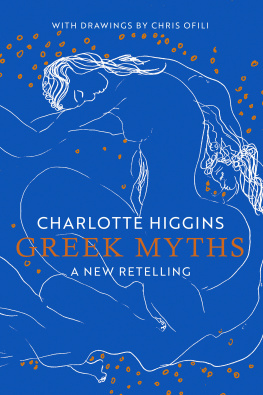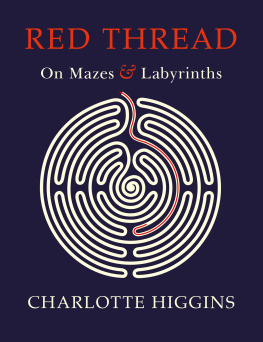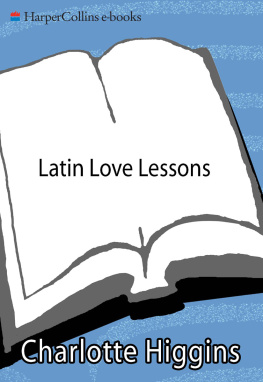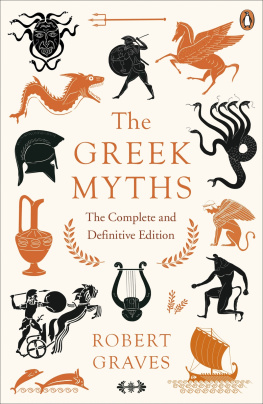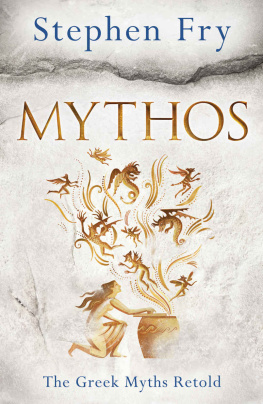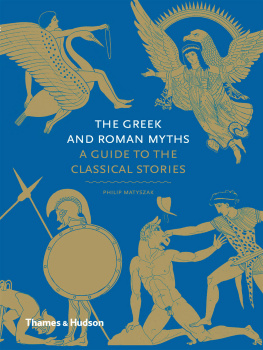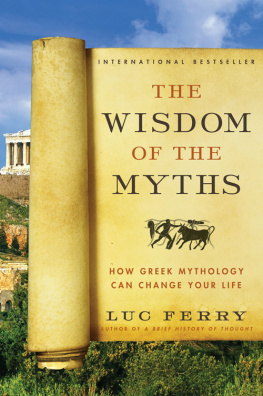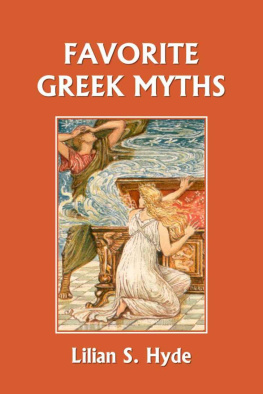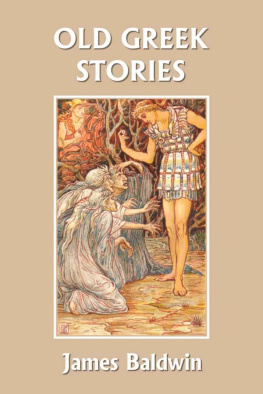Charlotte Higgins - Greek Myths: A New Retelling
Here you can read online Charlotte Higgins - Greek Myths: A New Retelling full text of the book (entire story) in english for free. Download pdf and epub, get meaning, cover and reviews about this ebook. year: 2021, publisher: Penguin Random House UK, genre: Art. Description of the work, (preface) as well as reviews are available. Best literature library LitArk.com created for fans of good reading and offers a wide selection of genres:
Romance novel
Science fiction
Adventure
Detective
Science
History
Home and family
Prose
Art
Politics
Computer
Non-fiction
Religion
Business
Children
Humor
Choose a favorite category and find really read worthwhile books. Enjoy immersion in the world of imagination, feel the emotions of the characters or learn something new for yourself, make an fascinating discovery.
- Book:Greek Myths: A New Retelling
- Author:
- Publisher:Penguin Random House UK
- Genre:
- Year:2021
- Rating:5 / 5
- Favourites:Add to favourites
- Your mark:
- 100
- 1
- 2
- 3
- 4
- 5
Greek Myths: A New Retelling: summary, description and annotation
We offer to read an annotation, description, summary or preface (depends on what the author of the book "Greek Myths: A New Retelling" wrote himself). If you haven't found the necessary information about the book — write in the comments, we will try to find it.
Greek Myths: A New Retelling — read online for free the complete book (whole text) full work
Below is the text of the book, divided by pages. System saving the place of the last page read, allows you to conveniently read the book "Greek Myths: A New Retelling" online for free, without having to search again every time where you left off. Put a bookmark, and you can go to the page where you finished reading at any time.
Font size:
Interval:
Bookmark:
Charlotte Higginss previous books include the acclaimed Under Another Sky: Journeys in Roman Britain, which was shortlisted for awards including the Samuel Johnson (now Baillie Gifford) Prize for non-fiction, and Red Thread, which was a Radio 4 Book of the Week and won the Arnold Bennett Prize 2019. She is chief culture writer of the Guardian, a past winner of the Classical Association prize, and a fellow of the Society of Antiquaries. She lives in London.
Chris Ofili is a British artist. He lives and works in Trinidad.
Thank you to my inimitable agent Peter Straus and his colleagues at Rogers, Coleridge and White.
Thank you to the best of editors, Bea Hemming, who, sitting outside the King Charles I pub in Kings Cross, London, in early August 2017, said, Why dont you do a book of Greek myths? To the entire team at Jonathan Cape, including Suzanne Dean, Neil Bradford, David Eldridge, Katherine Fry, Anna Redman Aylward, Ilona Jasiewicz. Thank you to Dan Franklin.
Thank you to Chris Ofili for making drawings of such rare beauty. It is an honour to share these pages with you. Thank you to Tamsin Wright and Kathy Stephenson.
Thank you to colleagues at the Guardian who made possible and tolerated my absences: Katharine Viner, Jan Thompson, Pippa Prior, Randeep Ramesh, Jonathan Shainin, Clare Longrigg, David Wolf, Alex Needham, Charlotte Northedge, Liese Spencer and Carey Evans.
Thank you to Mary Harlow for fielding my questions on ancient textiles, and helping me play around with a drop spindle and a warp-weighted loom. Thank you to Ellen Harlizius-Klck: she generously spent a morning showing me her work with the Penelope Project on ancient textiles, part of the Research Institute for the History of Technology and Science at the Deutsches Museum, Munich. Thank you Frank J. Nisetich (and Pindar) for the epigraph.
Thank you to two remarkable institutions: the American Academy in Rome, where I was made so welcome as a visiting fellow in 2018; and Gladstones Library in Flintshire, where I was a writer-in-residence for the month of February 2020, looked after so well and warmly by everyone there. I am extraordinarily fortunate to have been able to complete my residency before the Covid-19 pandemic meant the librarys temporary closure. Thank you, Peter Francis, Louisa Yates, and the whole team.
Thank you to two dear friends for being my first readers: Fiona Bradley and Sara Holloway.
Thank you to James Davidson, Tim Whitmarsh and Paul Cartledge for so generously reading the manuscript with expert eyes. You have saved me from many errors, and those that remain are my own.
Much help has been given, wittingly or unwittingly, by friends, classicists and writers (some being all three), including Richard Baker, Nick Barley, Andy Beckett, Francis Bickmore, Kate Bland, Emma Bridges, Xan Brooks, Aditya Chakrabortty, Agnes Crawford, Sarah Crown, Susanna Eastburn, David Fearn, Barbara Graziosi, Mark Haddon, Sophie Hay, Jon Hesk, Keith Miller, Camilla Norman, Charlotte Schepke, Ali Smith and Gary Younge.
Thank you to Cynthia Smart for being my first teacher of Greek and Latin. Thank you to the late classicists Jasper Griffin, Oliver Lyne and Michael Comber, who taught me about classical literature when I was a student. I was lucky enough to learn alongside three goddess-like women Emma Christian, Antonia Potter and Emily Wilson as well as Joshua St Johnston, who has been an inspiration these past thirty years.
Thank you to my beloved father Peter Higgins, who instilled in me (aged eight, over a badly composed thank-you letter, with reference to Evelyn Waugh) that the work of a writer is to redraft.
Thank you to my beloved mother Pamela Higgins, who died in November 2018. To her I owe more than can be expressed.
Thank you to Rob Higgins, for the first book of myths, and thank you, Pam Magee. Thank you to Rupert Higgins and Dawn Lawrence for keeping me alert to the natural world. Thank you to the ever-stimulating Miriam, Isaac and Simeon Bird, and to Zora Bird who arrived in August 2019 bringing delicious distraction.
Thank you to my wonderful nephew and nieces James and Emma Higgins, Tilda and Eleanor Lawrence to whom this book is affectionately and proudly dedicated.
Thank you most of all to Matthew Fox, for listening with love.
by the same author
Latin Love Lessons
Its All Greek To Me
Under Another Sky
This New Noise
Red Thread
For Greek and Roman texts in translation, the first port of call is the Penguin Classics and Oxford Worlds Classics series. In addition, I recommend Emily Wilsons pacey, intelligent translation of the Odyssey (W.W. Norton, 2018); Stanley Lombardo and Diane Rayors translation of Callimachuss Hymns, Epigrams, Select Fragments (Johns Hopkins University Press, 1988); Helene P. Foleys translation of The Homeric Hymn to Demeter, which also includes commentary and essays (Princeton University Press, 1994); Anne Carsons translation of Euripides, titled Grief Lessons: Four Plays (NYBR Classics, 2008); and a one-volume translation of sixteen Greek plays by scholars including Emily Wilson, titled The Greek Plays, edited by Mary Lefkowitz and James Romm (Modern Library, 2016).
The Loeb Classical Library of parallel Greek or Latin and English texts is particularly useful when it comes to fragments, for example the remaining scraps of the lost poems of the epic cycle: Greek Epic Fragments, edited by M.L. West (Harvard University Press, 2003).
Online, the Perseus Digital Library (perseus.tufts.edu) is a resource for Greek and Latin texts together with out-of-copyright commentaries and translations, and hyperlinks to dictionary tools.
The Dictionary of Classical Mythology (Penguin, 1991), an edited version (by Stephen Kershaw) of a classic 1950s work by Pierre Grimal, is a useful one-stop reference book.
For a sense of the sheer multiplicity of stories that are substantially lost to us, or exist only in fragments, I recommend Matthew Wrights accessible The Lost Plays of Greek Tragedy (two volumes, Bloomsbury, 2016/19). And if you want to get serious, try Robert Fowlers Early Greek Mythographers (two volumes, Oxford University Press, 2001/13), and Timothy Gantzs Early Greek Myth (two volumes, Johns Hopkins University Press, 1996).
On the history of spinning and weaving, the best all-round introduction is Womens Work: The First 20,000 Years: Women, Cloth, and Society in Early Times by Elizabeth Wayland Barber (W.W. Norton, 1996).
On the significance of Greek myths in general, a good place to start is Classical Mythology: A Very Short Introduction by Helen Morales (Oxford University Press, 2007); The Gods of Olympus: A History by Barbara Graziosi (Metropolitan, 2014); Battling the Gods: Atheism in the Ancient World by Tim Whitmarsh (Faber, 2016); Antigone Rising: The Subversive Power of the Ancient Myths by Helen Morales (Wildfire, 2020); and Pandoras Jar: Women in the Greek Myths by Natalie Haynes (Picador, 2020).
Reading Ovids Rapes is a seminal essay by feminist scholar Amy Richlin, collected in Pornography and Representation in Greece and Rome (Richlin, ed., Oxford University Press, 1992). The 1985 essay What Was Penelope Unweaving? by Carolyn Heilbrun, collected in her volume Hamlets Mother and Other Women (The Womens Press, 1991), helped me find a way to tell these stories.

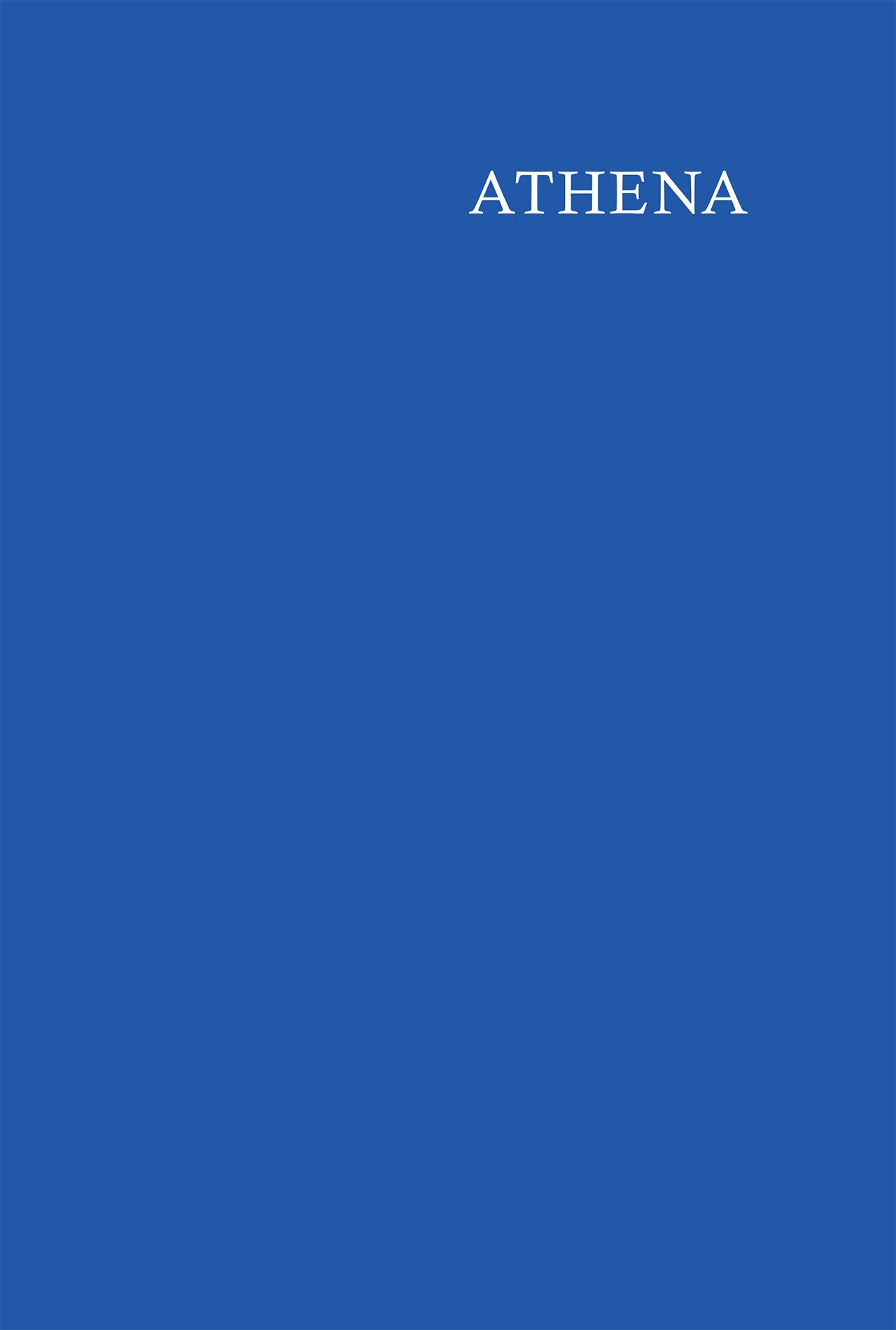
Font size:
Interval:
Bookmark:
Similar books «Greek Myths: A New Retelling»
Look at similar books to Greek Myths: A New Retelling. We have selected literature similar in name and meaning in the hope of providing readers with more options to find new, interesting, not yet read works.
Discussion, reviews of the book Greek Myths: A New Retelling and just readers' own opinions. Leave your comments, write what you think about the work, its meaning or the main characters. Specify what exactly you liked and what you didn't like, and why you think so.

